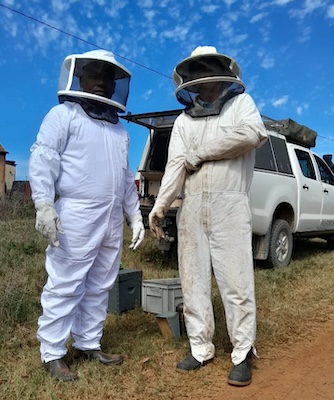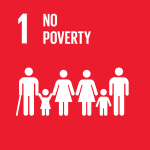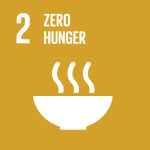
South Africa continues to grapple with persistent food insecurity. Government statistics indicate that 12 percent of households experience hunger. Nowhere is this more evident than in the Eastern Cape, the country’s most economically disadvantaged province, where climate change and recurrent drought further exacerbate difficulties in accessing or producing food.
The Eastern Cape holds vast agricultural potential, yet this has not translated into reduced poverty or expanded employment opportunities. Addressing this gap requires strengthening community-led solutions tailored to local needs and contexts.
Through support from the UNDP-Adaptation Fund Climate Innovation Accelerator (AFCIA), Ruliv, a non-profit organization dedicated to rural and urban socio-economic development, is working alongside communities to tackle these challenges head-on.
Cultivating food security through community gardens
In the Amatole Basin of the Eastern Cape, Ruliv has established one hectare of farmland across three sites—Khomkulu, Mkhobeni and Mqayise. Together, these sites have planted 10,000m² of vegetables for household consumption and income generation. Early harvests of spinach and cabbage have already been sold locally, and farmers are also supplying seedlings to their neighbours.
The gardens are grounded in a participatory approach, where communities are taking a leadership role. Communities identify the locations of garden sites, select interventions and explore complementary income-generating opportunities. This process has led to establishing sites close to schools, fostering climate and nutrition awareness among children, while also ensuring land is secured through the approval of traditional councils.
Community members also requested diversification through beekeeping, with technical support provided by experienced beekeepers and permaculture experts from the nearby village of Hogsback, who also facilitated connections to potential markets.
The initiative began with a 200m² pilot garden, alongside training in organic farming practices for 60 community members—half of them women. Building on this foundation, the project expanded to the full hectare of cultivated land now supporting the three sites.
Community based planning meetings. Photo: Ruliv
A sweet return on investment
Beekeeping has emerged as a complementary livelihood opportunity, with added benefits for local ecosystems and biodiversity. Under the mentorship of Vincent Shaw, a beekeeper from Hogsback with a lifelong passion for the craft, 18 new beekeepers were trained. Five of them now actively manage hives and have established a local beekeepers’ association.
Five hives have been strategically placed across the Amatole Basin, with support from Shaw in transferring wild hives and queen bees to ensure sustainability. While honey production requires patience and takes months before yields are viable for sale, daily monitoring and mentoring are helping sustain motivation.
“We chose to be beekeepers. The training that we received in beekeeping opened our eyes about the importance of looking after bees as part of nature, not just for honey. Going forward, we want to be well-known beekeepers, not only in the community but in the Eastern Cape province of South Africa. The future of beekeeping looks bright.” – Mhlambiso Lamla, a member of the newly developed beekeepers’ association

The new beekeepers in their protective suits. Photo: Ruliv
Gender dynamics shaping long-term development
The experience across the three gardens highlights the importance of social dynamics in sustaining success. In Khomkulu and Mkhobeni, where activities are largely led by men, farmers have struggled to remain engaged, in part due to pressures to generate immediate income.
By contrast, in Mqayise, where the garden is led entirely by women, participants have invested in long-term outcomes. They have installed a water tank, expanded their farm to 3,000m², planted 16 fruit trees and consistently produced crops.
“This farm has brought us a great relief. We don’t buy vegetables anymore. With this we are going to feed the whole community.” – Sinyongo Nonyameko, treasurer of the Mqhayise garden
These lessons prove the value of tailoring each activity to local people who are best suited and able to deeply engage in its success. Women farmers have also taken extra steps to improve their crops and increase their sales, including composting and producing organic fertilizers such as “worm tea”—a nutrient-rich liquid derived from wormeries that enhances soil fertility and crop yields.
Community workers in the garden in Mqhayise. Photo: Ruliv
Strengthening partnerships for long-term resilience
While community-driven action is central, systemic support for smallholder farmers remains critical, including through policy.
To address the significant gaps, two University of Fort Hare interns joined Ruliv to monitor and evaluate local initiatives, generating evidence to inform policy dialogue and budget allocations that better reflect smallholder farmers’ needs.
“As an organization working for the public good, it is always our intention to influence policy, especially around livelihoods. In addition to knowing how to address government budget allocations, we also hope to show that removing value added taxes from local food products can increase peoples’ disposable incomes, as well as their nutrition.” – Vijay Makanjee, Ruliv’s director
Through vegetable gardening and beekeeping, communities in the Amatole Basin are building the foundations for greater food security, sustainable livelihoods and resilience to climate change. While immediate monetary gains are limited, the long-term benefits—especially when rooted in approaches that actively include and benefit women, strengthened by policy advocacy—hold promise for transforming local food systems and reducing poverty in South Africa’s Eastern Cape.
Water tank installed on the garden farm. Photo: Ruliv
*
Supported by financial contributions from the Adaptation Fund and the European Union, the UNDP-AFCIA programme has awarded 44 micro and small grants to locally led organizations across 33 countries worldwide, accelerating their innovative solutions to build resilience in the most vulnerable communities.
UNDP-AFCIA is one of two featured programmes under the Adaptation Innovation Marketplace (AIM), a multi-stakeholder strategic platform that promotes scaled-up adaptation at the local level.



